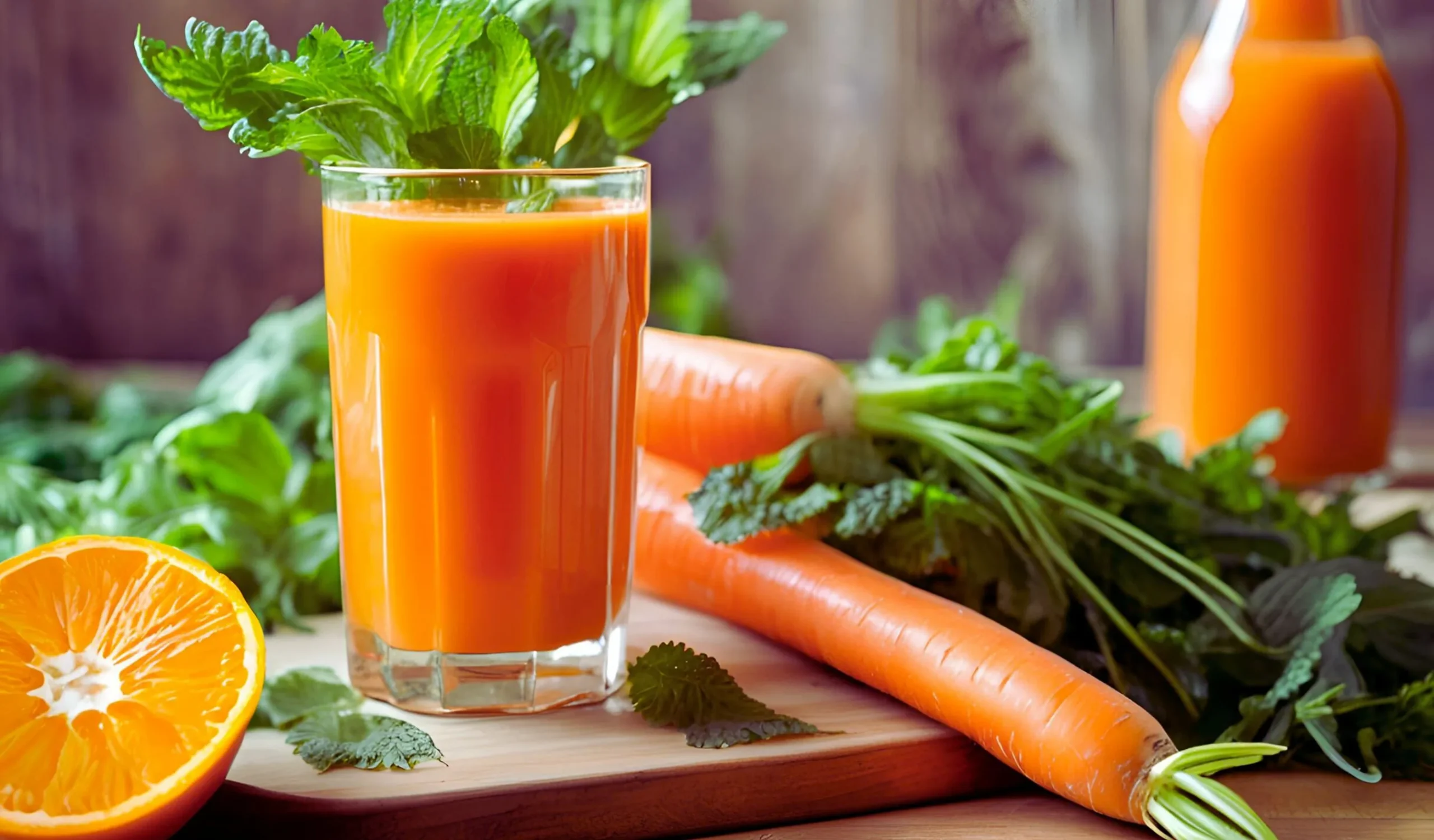Part 1: Introduction to Carrot Juice
Carrot Juice Recipe: A Nutrient-Packed Beverage
When it comes to nutrient-rich drinks, carrot juice holds its ground as a powerful, health-boosting beverage. Its vibrant orange hue isn’t just appealing; it’s a sign of its rich beta-carotene content, which your body converts into vitamin A. But there’s more! From improving vision to giving your skin a radiant glow, Carrot juice preparation packs a punch.
This drink isn’t just a modern trend. Historically, cultures across the globe have celebrated carrots for their medicinal and culinary value. While many associate them with crunchy snacks or stews, carrots also transform beautifully into a refreshing drink.
The Nutritional Benefits of Carrot Juice Recipe
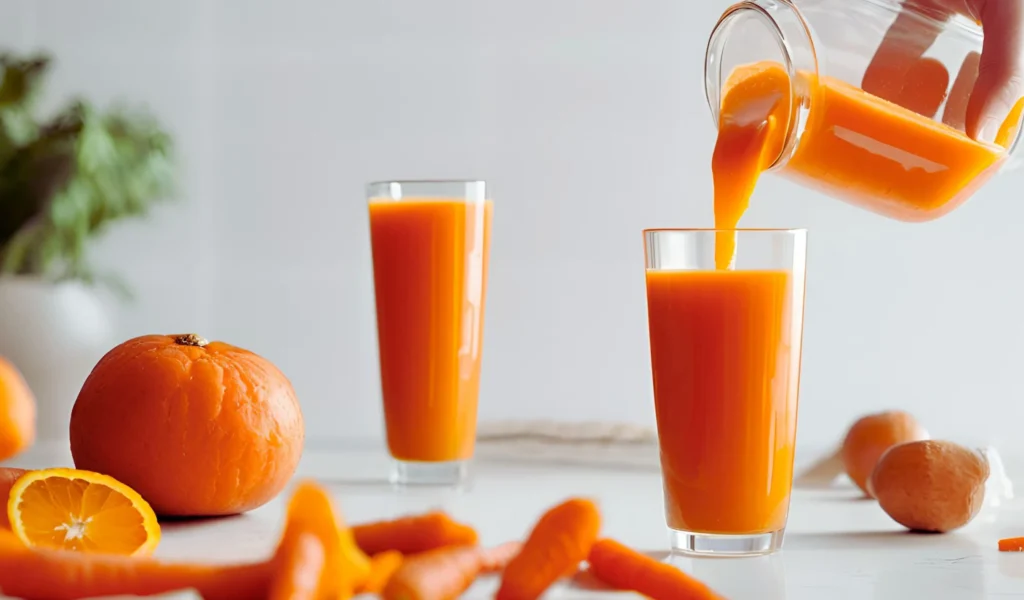
Let’s talk nutrition. Carrot juice is brimming with essential nutrients, including vitamins A, C, and K, as well as potassium and antioxidants. These components work in harmony to:
- Strengthen your immune system.
- Improve eyesight by supporting retina health.
- Detoxify your body and enhance digestion.
Moreover, the antioxidants in fresh carrot juice fight free radicals, reducing oxidative stress and supporting overall well-being. It’s a health elixir you can sip daily!
Historical Background of Carrot Juice Consumption
Did you know carrots weren’t always orange? Historically, carrots were purple, red, or even black before evolving into the orange variety we know today. Carrot juice consumption has roots in Middle Eastern and Asian cultures, where it was prized for its medicinal properties.
In modern times, homemade carrot juice gained traction as part of the juicing movement. With growing awareness of its health benefits, people have embraced it not only for its refreshing taste but also for its versatility—mix it with fruits or spices, and it adapts to any palate.
Part 2: Health Benefits of Carrot Juice
Boosting Immunity with Carrot Juice Recipe
Carrot juice isn’t just a tasty drink; it’s an immune-boosting powerhouse. Thanks to its high levels of vitamin C and antioxidants, drinking carrot juice regularly can fortify your immune defenses. Vitamin C, a key player in the immune system, stimulates the production of white blood cells, your body’s frontline defense against infections.
Additionally, carrots contain beta-carotene, a precursor to vitamin A, which aids in the production of mucous membranes. These membranes form a protective barrier in your nose, throat, and lungs, making it harder for pathogens to invade. What’s more, the polyphenols and potassium found in fresh carrot juice reduce inflammation, which is often the root of many illnesses. Whether it’s flu season or you’re looking to stay strong year-round, sipping on carrot juice is a delicious way to support your body.
Enhancing Vision and Eye Health
Carrot juice is perhaps best known for its role in improving vision, and this reputation is well-deserved. It’s packed with beta-carotene, which your body converts into vitamin A—a nutrient essential for maintaining healthy eyes. Vitamin A helps in forming the pigment rhodopsin, necessary for low-light and color vision.
Moreover, antioxidants like lutein and zeaxanthin in carrots protect the eyes from oxidative stress, reducing the risk of macular degeneration and cataracts. Regularly drinking homemade carrot juice can also alleviate dryness in the eyes, as its hydration properties work in tandem with its nutrients to promote comfort. Whether you spend hours in front of screens or are concerned about age-related eye conditions, a daily glass of carrot juice can make all the difference.
Promoting Skin Health and Radiance
For glowing, radiant skin, carrot juice is a natural beauty tonic. Its high vitamin C content supports collagen production, which is vital for keeping skin firm and youthful. Collagen not only reduces the appearance of fine lines and wrinkles but also improves skin elasticity, leaving you looking rejuvenated.
Beta-carotene works wonders for skin health, too. As it’s converted into vitamin A, it aids in repairing skin tissues and protecting against harmful UV rays. If you’re battling acne, you’ll be happy to know that carrot juice’s natural anti-inflammatory properties can help reduce redness and irritation.
Finally, hydration is key to achieving radiant skin, and carrot juice provides that in abundance. Pair it with spices like turmeric or ginger for an added anti-inflammatory boost, and you’ll have a glowing complexion that turns heads.
Part 3: How to Make Carrot Juice Recipe at Home
Selecting the Right Carrots for Juicing
Not all carrots are created equal when it comes to juicing. For the best results, choose fresh, vibrant, and firm carrots with a bright orange hue. These are rich in beta-carotene and deliver the sweetest juice. Organic carrots are highly recommended since they are grown without pesticides, which could affect both taste and nutrition.
Small to medium-sized carrots are ideal, as they tend to be sweeter and less woody compared to larger ones. Avoid carrots with soft spots or a pale color—these often lack flavor. If you want a unique twist, try purple or yellow carrots for a colorful, nutrient-dense juice.
Equipment Needed for Carrot Juice Preparation
To make carrot juice at home, you don’t need fancy gadgets, but having the right tools can make the process more efficient. A high-quality juicer is the most straightforward option, extracting juice while separating the pulp effortlessly. Centrifugal juicers are great for speed, while masticating juicers yield more juice with less waste.
No juicer? No problem! A blender works just as well. You’ll also need a fine mesh strainer or cheesecloth to remove the pulp. A sharp knife for chopping carrots and a vegetable peeler to remove the skin are also essential. For an elevated experience, use a glass pitcher to store your juice and preserve its freshness.
Step-by-Step Guide to Making Carrot Juice Recipe
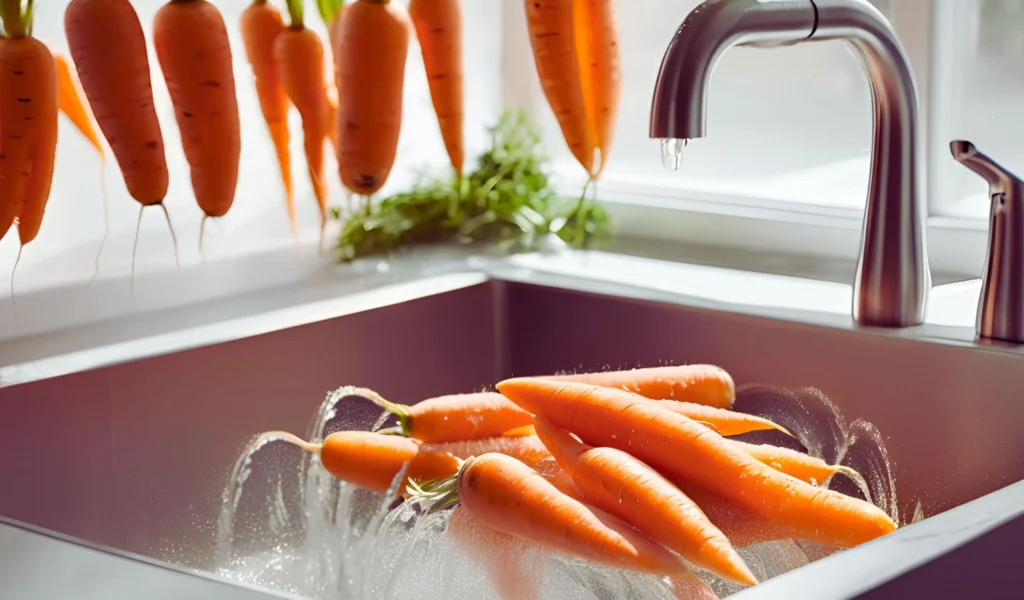
Preparing the Carrots
Start by washing your carrots thoroughly under running water to remove dirt and pesticides. If you’re using organic carrots, you can skip peeling, as much of the nutrients are in the skin. For non-organic carrots, use a vegetable peeler to remove the outer layer. Chop the carrots into smaller pieces for easier blending or juicing.
Juicing Methods: Blender vs. Juicer
- Using a Juicer:
Place the carrot pieces into the juicer’s chute. Switch on the juicer, and let it do its magic! Collect the juice in a clean glass or container, discarding the pulp or saving it for other recipes like carrot muffins. - Using a Blender:
Add chopped carrots and a small amount of water to the blender. Blend until smooth, then pour the mixture into a fine mesh strainer over a bowl. Press down with a spoon to extract as much juice as possible.
Straining and Serving the Juice
Once your juice is extracted, transfer it to a glass for serving. For added flavor, mix in a squeeze of lemon juice, a pinch of ginger, or a sprinkle of turmeric. Garnish with a sprig of mint, and serve chilled. You’ve just made your very own fresh carrot juice—refreshing and full of goodness!
Part 4: Enhancing Your Carrot Juice Recipe
Popular Carrot Juice Combinations
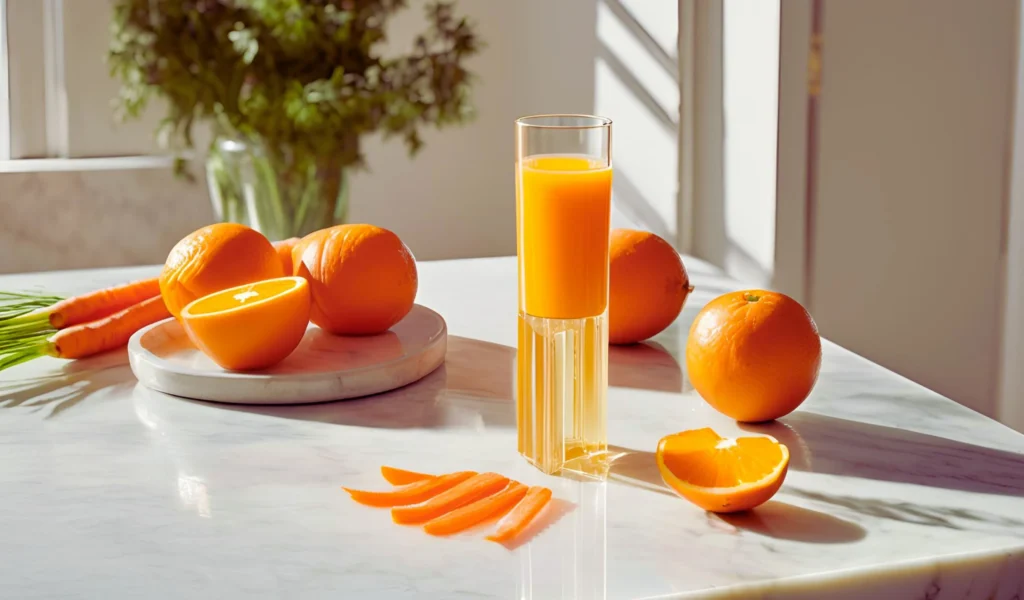
Carrot juice is delicious on its own, but pairing it with complementary ingredients takes the flavor and health benefits to another level. Here are some exciting combinations to try:
Carrot and Ginger Juice
For a zesty twist, add a slice of fresh ginger to your carrot juice. Ginger not only enhances the flavor with its spicy warmth but also offers anti-inflammatory benefits and aids digestion. Blend carrots and ginger together, then strain for a smooth, invigorating drink. It’s perfect for chilly mornings or post-workout recovery.
Carrot and Orange Juice
Combine the natural sweetness of carrots with the tangy, citrusy burst of oranges. This duo is a vitamin C powerhouse that boosts immunity and refreshes your palate. Simply juice carrots and fresh oranges together. Garnish with a thin orange slice for a visual treat.
Carrot, Apple, and Beet Juice
This vibrant red juice combines the earthy flavor of beets with the sweetness of apples and carrots. Rich in antioxidants, this blend is excellent for detoxing and improving blood circulation. Peel and chop the ingredients, then juice them together. For an extra zing, add a squeeze of lemon juice.
Adding Spices and Herbs for Extra Flavor
Why stop at fruits when you can infuse your carrot juice with aromatic spices and fresh herbs? These additions not only elevate the flavor but also enhance the health benefits.
Benefits of Adding Turmeric
A pinch of turmeric turns your carrot juice into an anti-inflammatory super drink. Turmeric’s active compound, curcumin, helps fight inflammation and supports joint health. Pair it with a dash of black pepper to increase absorption.
Incorporating Mint and Basil
Fresh mint leaves add a cooling, refreshing taste to carrot juice, making it a great option for hot summer days. Basil, on the other hand, lends a subtly sweet and herbal note. Both herbs also aid digestion and provide a burst of flavor that complements the natural sweetness of carrots.
Part 5: Storing and Preserving Carrot Juice Recipe
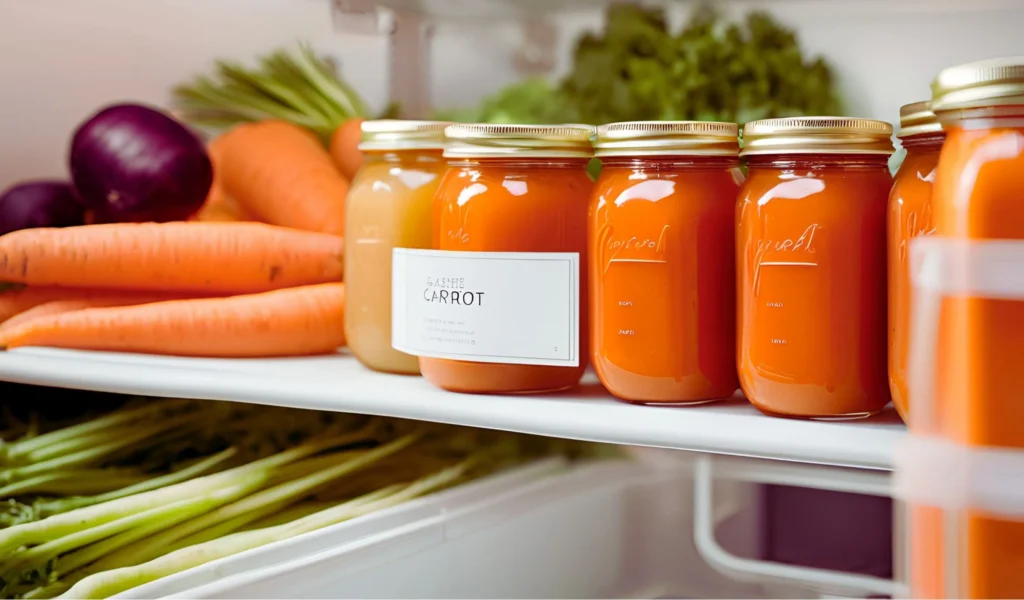
Best Practices for Storing Fresh Carrot Juice Recipe
To keep your homemade carrot juice fresh and flavorful, proper storage is key. Always transfer the juice to an airtight glass container immediately after preparation. Glass jars or bottles help prevent oxidation, which can degrade the juice’s nutrients.
Refrigeration is a must. Store the juice at a temperature of 32–40°F (0–4°C). If possible, fill the container to the brim to minimize air exposure. For added freshness, consume the juice within 24–48 hours. Longer storage times may compromise its flavor and nutritional value.
Understanding Shelf Life and Nutrient Retention
Carrot juice is best consumed fresh, but sometimes you need to store it for later. While refrigeration preserves its flavor for up to two days, nutrient levels gradually decline. Vitamins like vitamin C are particularly sensitive to light and air, so keep the juice in a dark, cool space if refrigeration isn’t available.
If you need to store carrot juice for longer periods, consider freezing it. Use freezer-safe containers, leaving a bit of space at the top for expansion. Frozen carrot juice can last up to three months, although the texture might change slightly upon thawing. When you’re ready to enjoy it, simply thaw the juice in the fridge and shake well before serving.
Part 6: Frequently Asked Questions (FAQs)
FAQs about Carrot Juice Recipes
Curious about carrot juice? Here are answers to some of the most commonly asked questions about making and enjoying this nutrient-packed beverage.
Can I make carrot juice without a juicer?
Absolutely! You don’t need a fancy juicer to enjoy fresh carrot juice. A blender works just as well. Simply chop the carrots into smaller pieces, add them to the blender with a bit of water, and blend until smooth. Afterward, strain the mixture through a fine mesh strainer or cheesecloth to remove the pulp. It’s a quick and easy method that anyone can try at home.
How often should I drink carrot juice?
Moderation is key with any healthy habit. Drinking carrot juice two to three times a week is a great way to reap its health benefits without overdoing it. For those aiming to improve their vision, boost immunity, or enjoy glowing skin, a small glass daily can be beneficial. However, always listen to your body and adjust based on your nutritional needs.
Can I mix carrot juice with other vegetable juices?
Definitely! Carrot juice is incredibly versatile and pairs well with many other vegetables. Try combining it with beet juice for a detoxifying boost or celery juice for added hydration. Mixing it with greens like spinach or kale increases the nutritional profile and gives you a powerhouse of vitamins and minerals.
Is it safe to consume carrot juice daily?
Yes, it’s safe to drink carrot juice daily for most people, provided you consume it in moderation. Aim for about 8–12 ounces a day. Overconsumption can lead to carotenemia, a harmless condition where your skin takes on a yellowish tint due to high levels of beta-carotene. If you notice this, simply reduce your intake.
How can I reduce the sugar content in carrot juice?
Carrots naturally contain sugar, but you can balance the sweetness by adding low-sugar ingredients like cucumber or leafy greens. Another trick is to dilute the juice with water or unsweetened herbal tea. This not only cuts down on sugar but also increases hydration.
What are the side effects of drinking too much carrot juice?
While carrot juice is packed with nutrients, excessive consumption can have drawbacks. Besides carotenemia, drinking too much can lead to digestive issues such as bloating or diarrhea. It’s also worth noting that those with kidney issues should limit their intake, as carrots are moderately high in potassium.
Print
Carrot Juice Recipe: How to Make Delicious and Healthy Carrot Juice at Home
- Total Time: 10 minutes
- Yield: 2 servings 1x
- Diet: Gluten Free
Description
A vibrant and refreshing homemade carrot juice packed with beta-carotene, antioxidants, and essential vitamins to boost immunity, improve vision, and promote radiant skin.
Ingredients
- 4 large carrots, washed and chopped
- 1/2 cup water (for blending method)
- 1-inch piece of ginger (optional)
- 1/2 lemon, juiced (optional)
- Ice cubes (optional)
Instructions
- Wash and chop the carrots into small pieces.
- If using a juicer, feed the carrots through the chute and collect the juice.
- If using a blender, add carrots and water, then blend until smooth.
- Strain the juice using a fine mesh strainer or cheesecloth.
- Add ginger or lemon juice for extra flavor (optional).
- Serve fresh over ice.
Notes
For an extra health boost, add turmeric or mix with orange juice for a citrusy twist.
- Prep Time: 5 minutes
- Cook Time: 5 minutes
- Category: Juice
- Method: International
- Cuisine: Vegan
Nutrition
- Serving Size: 1 cup
- Calories: 90 kcal
- Sugar: 9g
- Sodium: 66mg
- Fat: 0.4g
- Saturated Fat: 0.1g
- Unsaturated Fat: 0.3g
- Trans Fat: 0g
- Carbohydrates: 22g
- Fiber: 2g
- Protein: 2g
- Cholesterol: 0mg
Keywords: Carrot juice, homemade carrot juice, carrot juice recipe, healthy juice, detox juice, vitamin A drink

